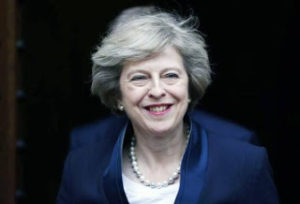
President Donald Trump vowed to end business as usual in Washington. Global companies are now learning just what that means.
What began before his inauguration, with attempts to cajole corporations like Toyota Motor into keeping jobs in the US with critical tweets, is now escalating into a crucial test for business leaders trying to maintain cross-border flows of people and goods that underpin commerce in the 21st century.
Trump’s Friday signing of an executive order barring the citizens of seven Muslim-majority countries from entering the US, on the heels of his war of words with Mexico over trade, alarmed executives from big employers including General Electric (GE), Google and Microsoft.
GE Chief Executive Officer (CEO) Jeff Immelt’s response underscored the delicate balance business will have to strike. “We have many employees from the named countries and we do business all over the region,” he said in an internal e-mail. While he called his staff “critical to our success,” he avoided direct criticism of Trump’s policy. GE “will continue to make our voice heard with the new administration and congress and reiterate the importance of this issue,” he said.
Trump’s order shut the door to nationals of Iran, Iraq, Libya, Somalia, Sudan, Syria and Yemen — including refugees, visiting scholars and even permanent American residents who happened to be abroad for work or holidays.
“We would never think this would become any kind of an issue,” Ludwig Willisch, chief executive officer of North American operations at Bayerische Motoren Werke, said at an automotive conference on Saturday. “This country is a melting pot, freedom of speech, everybody gets together and creates this great country. So, we were not prepared for this kind of thing.”
In a sharply worded message to staff, Lloyd Blankfein, Goldman Sachs’s long-time head, broke with the Trump administration over its controversial attempt to crack down on immigration. The voicemail, sent on Sunday to the firm’s 34,400 employees, pits Blankfein against an administration stocked with Goldman Sachs Group veterans, including his former No. 2, Gary Cohn, and key Trump advisor Steven Bannon. Blankfein told employees that President Donald Trump’s executive order, parts of which were blocked by federal courts, is at odds with the firm’s long-held policies on workforce diversity and could disrupt Goldman Sachs’s business. “This is not a policy we support,” the chief executive officer said. Other Wall Street firms took a softer approach. JPMorgan Chase & Co’s operating committee, led by CEO Jamie Dimon, said in a memo to staff on Sunday that it’s “grateful for the hard work and sacrifices made to keep our country safe,” and that the country was “strengthened by the rich diversity of the world around us.” It didn’t express an opinion on the policy.
Wells Fargo & Co and Morgan Stanley said they were monitoring the ban’s impact on employees.
Steve Schwarzman, CEO of the world’s largest private equity firm, Blackstone Group, took a pass when asked about the immigrant order’s effect on his business. “I’m not going to comment on that,” he said at a Catholic Charities luncheon on Sunday, where Governor Andrew Cuomo and Senator Charles Schumer, both New York Democrats, used their remarks to about 150 guests to oppose the order.
Optimists suggested he would quietly drop pledges to tear up trade deals and reconsider defense commitments to allies.
The about-face was epitomized by Tesla Motors Inc. founder Elon Musk; earlier this week he praised Trump’s nominee for secretary of state, former Exxon Mobil Corp. CEO Rex Tillerson, as a potentially “excellent” pick. On Sunday, Musk asked his 6.89 million Twitter followers to read the immigration order and suggest amendments, which he will then take to Trump’s CEO advisory council to develop a consensus and present to the president.
On the other hand, US auto companies, whose home state of Michigan has a large Arab community, have yet to make their views known.
Wall Street has also largely stayed out of the fray. At some of its biggest banks, executives said they were struggling to understand whether the order will ultimately apply to employees who work in the US with green cards or legal work permits. If it doesn’t hit visa holders, few major companies’ employees will be affected, according to one executive who asked not to be identified because he wasn’t authorized to comment. On Sunday, JPMorgan said it was working to assist affected employees.
Starbucks Corp. CEO Howard Schultz said the executive order left him with “deep concern, a heavy heart and a resolute promise.” The coffee chain will redouble efforts to hire as many as 10,000 refugees over five years in 75 countries, he wrote in a note to employees Sunday.
Reaction to the ban was sharpest from the technology industry, with Twitter awash in reminders that Apple Inc. co-founder Steve Jobs was the son of a Syrian immigrant. Among the first to speak out was Google CEO Sundar Pichai, himself an immigrant from India, who called the policy “painful.” Another India-born CEO, Microsoft Corp.’s Satya Nadella, took to LinkedIn to highlight “the positive impact that immigration has on our company, for the country, for the world.”
Trump should expect sustained challenges from the tech industry in particular, said Ian Bremmer, CEO of political consultancy Eurasia Group, because it differs significantly with him on issues from net neutrality to immigration. “While most every CEO wants to just ‘get back to business’ after Trump’s election, that’s going to prove much harder” for technology leaders, he said. “There’s going to be a fight.”
Compounding business leaders’ unease was the order’s confused implementation, which included unclear directives on how border agents should treat lawful permanent residents, and contradictory statements about how it would affect those who hold passports from two countries — for example, a dual citizen of Iran and the UK
For now, lawyers are advising such individuals not to travel to the US, or to stay put if they already live there. The new rules came into force with no transition period, leaving carriers like Emirates and American Airlines Group Inc. unsure what to do with passengers booked to fly to US airports, or already in the air.
“We are committed to protecting our people and will provide whatever support is necessary to protect them and their families,” Michael Roth, CEO of advertising firm Interpublic Group of Cos., wrote in an e-mail.
The most important business stories of the day. Get Bloomberg’s daily newsletter. The move’s implications extended far beyond the business world. On Sunday the British long-distance runner Mo Farah, a four-time Olympic gold medalist who
was born in Somalia, said he may not be able to return to Oregon, where he trains and lives with his children. The Academy of Motion Picture Arts and
Sciences said Oscar-winning Iranian director Asghar Farhadi may be unable to attend this year’s awards, for which his film “The Salesman” has been nominated.
Trump’s order has “significant commercial implications,” said Allyson Stewart-Allen, CEO of International Marketing Partners in London, who advises European companies on doing business in the US “What do you do with an employee on an executive salary who’s sitting in an airport lounge kind of like Tom Hanks in ‘The Terminal’?”
Source: http://www.business-standard.com/article/international/us-inc-faces-uneasy-test-of-doing-business-117013100003_1.html






